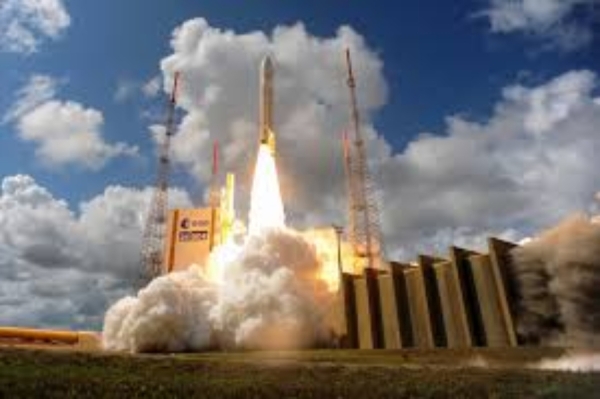Americans’ views of space: US role, NASA priorities and impact of private companies

| In a changing world of space exploration defined by intensifying private efforts and competition between a growing number of nations, 69% of Americans say it is essential that the U.S. continue to be a world leader in space, compared with 30% who say this is not an essential role for the country, according to a new Pew Research Center survey. The new report, based on a survey of 10,329 U.S. adults conducted May 30 to June 4, 2023, on the Center’s American Trends Panel, finds that most Americans continue to believe that the U.S. space agency NASA has a critical role to play, even as private space companies, like SpaceX, Blue Origin and Virgin Galactic, are increasingly involved in space. Overall, 65% say it is essential that NASA continue to be involved in space exploration. A smaller share (32%) believe that private companies will ensure enough progress is made in space exploration, even without NASA’s involvement. As Americans look to the future of space, 69% think there will definitely or probably be a major problem with debris in space from rockets, satellites and other human-made objects over the next 50 years. When it comes to space tourism, 55% of Americans expect people will routinely travel to space as tourists by the year 2073, while 44% think this will not happen. At the same time, Americans see other futuristic possibilities in space as less likely in the next 50 years: 44% think the U.S. will definitely or probably fight against other nations in space during this period, and 40% believe intelligent life will definitely or probably be discovered on another planet. Only about one-third of Americans say colonies that can be lived in for long periods of time will be built on other planets in the next 50 years, while 65% say this will not happen. The new Pew Research Center survey takes a wide-ranging look at Americans’ attitudes toward space. Key findings from the report include: Americans place monitoring asteroids that could hit Earth at top of NASA’s priority list. Six-in-ten Americans say this should be a top priority for NASA, and another 30% say this is an important but lower priority. Monitoring the planet’s climate system also ranks highly as a priority for NASA, with 50% of Americans saying this should be a top priority. Fewer than half of Americans rate the other seven objectives included in the survey as top priorities for NASA: 40% say conducting basic scientific research to increase knowledge of space should be a top priority, and 35% say the same for developing technologies that could be adapted for other uses. Relatively few Americans say it should be a top priority for NASA to search for life and planets that could support life (16%) or to send human astronauts to the moon (12%) or Mars (11%). Republicans and Democrats have similar views on the U.S. role in space and NASA’s priorities, but differ on monitoring Earth’s climate. Republicans and Democrats, including those who lean to each party, are nearly equally likely to say the U.S. should be a world leader in space exploration (72% and 69%, respectively). They also have largely similar views on many of NASA’s priorities, with 64% of Democrats and 57% of Republicans saying that monitoring asteroids that could hit the Earth should be a top priority for NASA. However, partisans differ over how much priority NASA should put on monitoring the Earth’s climate system. About seven-in-ten Democrats say monitoring key parts of the climate should be a top priority for NASA, compared with just 30% of Republicans who say the same. Public ratings of private space companies tilt positive for most aspects of their performance, but many Americans remain unsure: When asked to assess four core areas of private space companies’ performance, 48% of Americans say private space companies are doing a mostly good job building rockets and spacecraft that are safe and reliable, compared with 12% who say they’re doing a mostly bad job. Another 39% say they aren’t sure. Americans show similar sentiments when asked about private space companies making important contributions to space exploration: 47% say these companies are doing a mostly good job at this, 12% say these companies are doing a mostly bad job, and 40% say they aren’t sure. Meanwhile, the public strikes a less positive tone when it comes to how private space companies are doing limiting debris in space from rockets and satellites: 26% say they are doing a mostly bad job, compared with 21% who say they are doing a mostly good job (53% say they’re not sure). Americans, on balance, are not enthusiastic about traveling to space themselves: 35% say they would be interested in orbiting Earth in a spacecraft, compared with 65% who say they would not be interested in this. Interest is down 7 percentage points since 2018, the last time the Center asked this question. Interest in orbiting the Earth is greater among younger than older adults: About half of those ages 18 to 29 (48%) say they would definitely or probably be interested in orbiting the Earth in a private spacecraft, while just 17% those 65 and older say the same. Men are especially likely to support a US leadership role in space, be familiar with NASA and have engaged with space-related activities. Men are 12 percentage points more likely than women to say it is essential that the U.S. continue to be a world leader in space exploration (75% vs. 63%). Men are also somewhat more likely than women to say they are familiar with NASA, saying they have heard at least a little about the U.S. space agency in the past year (75% of men vs. 60% of women). Similarly, men are more likely than women to say they’ve participated in at least one space-related activity within the last year (55% of men vs. 38% of women). Nonetheless, men and women have largely similar views on most of NASA’s priorities included in the survey. |
| These are among the findings from the new report, which is based on a survey of 10,329 U.S. adults conducted from May 30 to June 4, 2023, using the Center’s American Trends Panel. The margin of error for the full sample is plus or minus 1.5 percentage points. |
| To read the full report, click here: https://www.pewresearch.org/science/2023/07/20/americans-views-of-space-u-s-role-nasa-priorities-and-impact-of-private-companies/ Methodology: https://www.pewresearch.org/science/2023/07/20/views-of-space-methodology/ Survey topline: https://www.pewresearch.org/science/wp-content/uploads/sites/16/2023/07/PS_2023.07.20_Space_TOPLINE.pdf |
Share this article:



